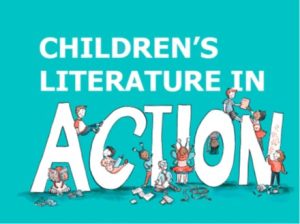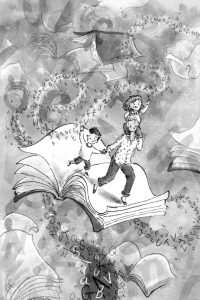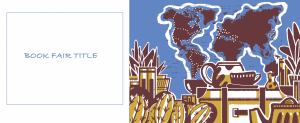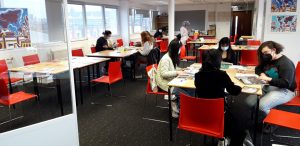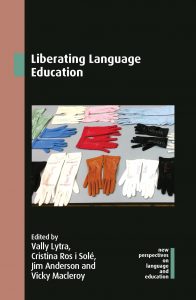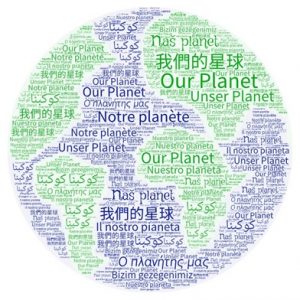
Figure 1: Our Planet Festival Languages by Yu-Chiao Chung
In these uncertain times the theme of ‘Our Planet’ is a crucial topic for young people to engage with, research, and think about how to change their environments. In the online festival in June 2021, as well as the digital stories on the theme of ‘Our Planet’, students produced artwork and multilingual poetry to express their views.
Aims of ‘Our Planet Festival 2021’
- Connect children and young people with their environment, cultural heritage, and languages through taking action and telling stories on issues that matter to them (cosmopolitan citizenship).
- Connect children and young people with each other locally and globally.
- Develop children’s imagination, creativity, and multilingual repertories.
- Improve children’s communication skills and ability to make meaning through narrative and still/moving images and gain understanding of multimodal literacy and intertextual relationships.
- Gain understanding of issues and strategies in translation activities and subtitling (metalinguistic awareness).
- Enable creative and critical use of digital technology to transform stories.
- Encourage critical thinking, activist citizenship, and international partnerships.
- Develop children’s understanding of aesthetics and narration through creating artwork and poetry.
Our Planet Festival 2021 celebrated the multilingual lives of children and young people through their artwork, multilingual poetry, and the bi- and multi- lingual digital stories they created during the pandemic. Educators worked with young participants (6 – 17 years old) across 16 educational institutions (primary, secondary, community-based complementary, pupil referral unit, NGO), 7 countries (England, Croatia, Cyprus, Egypt, Germany, Taiwan, Turkey) and a range of 20 languages. The young people exhibited their striking and original artwork and poetry on the project website and their 3–5-minute films were shown at an online screening event supported by Deptford Cinema.
Online Our Planet Festival – Friday 11 June 2021
Michael Rosen opened the festival with a multilingual poetry performance including some of his latest poems from his book On the Move: Poems About Migration (2020). Michael Rosen commented on the theme of the festival.
‘We’re talking about ‘Our Planet’ so this is one of the things that we share. We share the fact that we are multilingual … one of the reasons why we are multilingual is because we migrate, we move … we don’t stay still … that’s why languages mix and change and we speak many languages’.
Project schools joined from different countries and students were thrilled to participate in a Q & A with Michael Rosen.
Children asked Michael about becoming a poet, writing poetry, his poems, his preferred language, and being an educator as well as a poet.
Artwork and multilingual poetry
Michael Rosen’s poetry performance was followed by a short online tour of the artwork and multilingual poetry children and young people created for the festival.

Figure 2
لما لا يسود السلام في العالم
‘Why not a peaceful world?’
Sobhia Anfal Boularas
Peace School, North London
This work can be accessed from the different schools on the project website here:
Multilingual Poetry Workshop
Michaël Vidon, spoken word educator, poet and French teacher (at Seaford Head School) led an hour’s online multilingual poetry workshop for all participants. Michaël Vidon engaged participants in thinking about words, about obstacles, about places where humans and nature are side by side fighting, about messiness, about danger and comfort. He talked about editing and when and how to move between languages in multilingual poetry and about rhyme and rhythm. Project participants experimented writing across languages.
Online screening event supported by Deptford Cinema
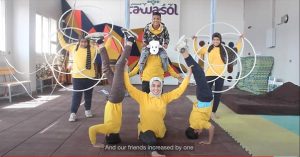
Figure 3: Congratulations, you have won a sheep! (Tawasol Community School, Cairo, Egypt)
There were 20 short films including 20 languages and short, pre-recorded introductions to each film. Participants watched the films together across the different countries and the screening was accessible on the Deptford Cinema @ Home platform for 6 weeks (Deptford Cinema). The films can now be accessed on Critical Connections website.
Deptford Cinema is a volunteer run, not-for-profit, community cinema in Deptford (close to Goldsmiths). Deptford Cinema volunteers, Lucy Rogers and Louis Holder, supported the online screening producing a film booklet and editing the overall screening. The Our Planet Digital Storytelling Booklet contains a listing of all the films and more detailed descriptions of the 20 films and project participants.
Our Planet Festival Booklet
The individual films can be viewed here.
Reflections
The film festival was on national news in Taiwan (12 June 2021).
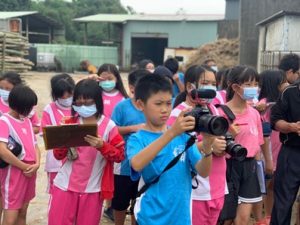
Figure 4: Revealing the Secrets of Joss Paper (Changsing Elementary School, Taiwan)
Children and young people shared their multilingual poetry, artwork and digital stories at local school and community events across countries in the project.
Children/young people reflected on the ‘Our Planet Festival 2021’
‘Some languages are very difficult to talk in. I knew some of the words. I wish I can read Greek and Mandarin’.
‘It was great to see children from around the world’.
‘We, the children, have to save our planet’.
‘We can all start from our homes and schools, influence a group’s opinion and hope they will influence others’.
‘I was very excited to see our film showcased. I loved watching other films’.
‘There were a variety of different films that intrigued me in many different ways, each one was unique, yet powerful’.
‘There are so many languages spoken in different countries. I didn’t know that. It was fascinating to see many films in different languages’.
‘People in different part of the world do different things and have their own ways of living and thought’.
Educators reflected on the ‘Our Planet Festival 2021’
‘Tainan Municipal Changsing Elementary School, Revealing the Secrets of Joss Paper. For most of us, this is a totally unknown world. Even if one is not part of the culture, one could easily follow and understand the importance of the matter to local people, and that, after all, they are facing similar difficulties we have here, with big industries endangering local crafts’.
‘I had no idea about joss paper and I was wondering if there are any other traditions that potentially put our environment in danger. That is a topic I would like to research with children, starting from our little country, and try to find some solutions to either make the effect less damaging for the planet or completely change it with something nature-friendly’.
‘In my class, children have proved they can complete a range of tasks, technology wise, and achieve much more than what we expect of them. They were able to use a range of multimedia programmes to put a clip together, add subtitles and use other features’.
‘I am very surprised and impressed that my students can finish their films during lockdown. I thought they would lose their motivation but the fact was that they were very engaged and responsible to work on their film. It has proved that if they are given some tasks which mean a lot to them, they would enjoy working on them’.
Critical Connections project (2021-22)
As the Critical Connections project moves into its tenth year, we are in the process of planning next year’s festival and waiting to hear about further funding for our work in the field of multilingual learning, environmental activism and the arts. Please get in contact if you are interested in participating in future projects.
Project Directors: Dr Vicky Macleroy, Dr Yu-Chiao Chung and Dr Jim Anderson
Centre for Language, Culture and Learning, Goldsmiths, University of London
Our Planet Festival 2021 was supported by Goldsmiths Public Engagement Fund (2020-21) and Deptford Cinema.
Blog by Vicky Macleroy
